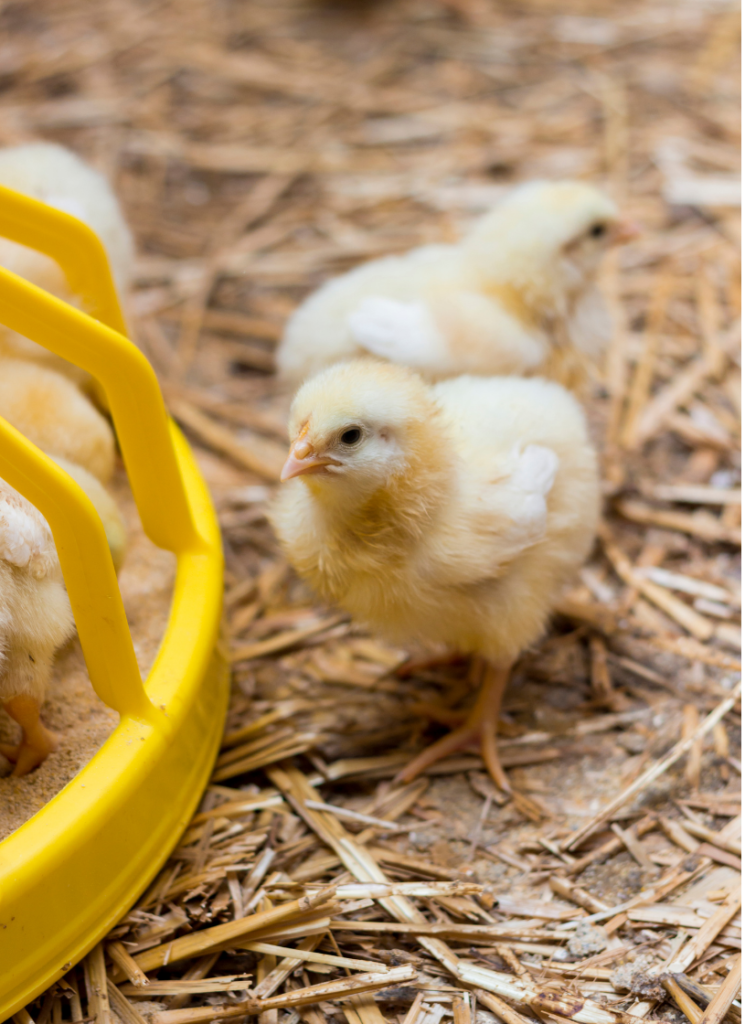More About Chickens
go.ncsu.edu/readext?800960
en Español / em Português
El inglés es el idioma de control de esta página. En la medida en que haya algún conflicto entre la traducción al inglés y la traducción, el inglés prevalece.
Al hacer clic en el enlace de traducción se activa un servicio de traducción gratuito para convertir la página al español. Al igual que con cualquier traducción por Internet, la conversión no es sensible al contexto y puede que no traduzca el texto en su significado original. NC State Extension no garantiza la exactitud del texto traducido. Por favor, tenga en cuenta que algunas aplicaciones y/o servicios pueden no funcionar como se espera cuando se traducen.
Português
Inglês é o idioma de controle desta página. Na medida que haja algum conflito entre o texto original em Inglês e a tradução, o Inglês prevalece.
Ao clicar no link de tradução, um serviço gratuito de tradução será ativado para converter a página para o Português. Como em qualquer tradução pela internet, a conversão não é sensivel ao contexto e pode não ocorrer a tradução para o significado orginal. O serviço de Extensão da Carolina do Norte (NC State Extension) não garante a exatidão do texto traduzido. Por favor, observe que algumas funções ou serviços podem não funcionar como esperado após a tradução.
English
English is the controlling language of this page. To the extent there is any conflict between the English text and the translation, English controls.
Clicking on the translation link activates a free translation service to convert the page to Spanish. As with any Internet translation, the conversion is not context-sensitive and may not translate the text to its original meaning. NC State Extension does not guarantee the accuracy of the translated text. Please note that some applications and/or services may not function as expected when translated.
Collapse ▲ Thinking back to April, I did an article which discussed some points to consider prior to picking out baby chicks at your local farm store. I wanted to get producers thinking about all the things that we sometimes forget to consider before we go headlong into an adventure and end up regretting it in the end and ultimately giving up on the whole project. Now that producers have had a month to consider all that was discussed in the April article, such as how many and what breed of chicken best suits your operation, lets jump into how to care for your new baby chicks at home.
Thinking back to April, I did an article which discussed some points to consider prior to picking out baby chicks at your local farm store. I wanted to get producers thinking about all the things that we sometimes forget to consider before we go headlong into an adventure and end up regretting it in the end and ultimately giving up on the whole project. Now that producers have had a month to consider all that was discussed in the April article, such as how many and what breed of chicken best suits your operation, lets jump into how to care for your new baby chicks at home.
When you bring home your new chicks keep in mind that day old chicks cannot maintain their own body temperature without supplemental heating. Therefore, you will need a brooder box for their first three weeks or so of age. On average a box measuring 2 ft wide x 3 ft long x 18 inches deep will house about 25 chicks, and can be adjusted accordingly for more or less animals. They will also need clean dry wood shavings (not cedar), dry sand, or other absorbent material in the bottom of the box in order to keep their environment clean and dry. Cedar shavings are dangerous for baby chicks and should not be used, use pine shaving instead.
For the size brooder box mentioned above, a single heat lamp should be mounted approximately 8 inches above the bottom of the box keeping the temperature around 95°F on the first day of age, and then reduce the temperature by 5° per week until you reach ambient temperature. If your chicks are huddled under the lamp, this is a sign they are too cold. Lower the lamp slightly. If they move away from the lamp or are panting, this is a sign they are too hot. Raise the lamp slightly. Producers should keep the lamp on day and night for the first three weeks, by this time the chicks should be about half feathered and the heat can be reduced. When well feathered the chicks can be moved out to an unheated coop. When introducing new pullets to their coop do not mix new pullets and older hens.
Producers or prospective producers can find out more information pertaining to this article by contacting Kendra Fortner at the N.C. Cooperative Extension, Jackson County Center at 828-586-4009 or the N.C. Cooperative Extension, Swain County Center at 828-488-3848 or by email at kendra_norton@ncsu.edu.




